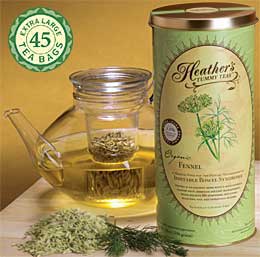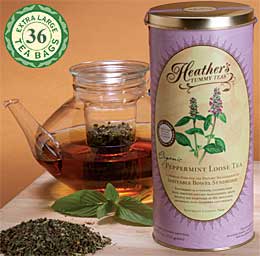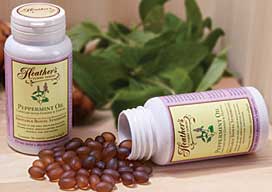| |

Did your email mangle this newsletter? Copy and paste this address into your browser window:
http://www.helpforibs.com/news/newsletter/081005.html or go here to see it online.
August 10, 2005
This week - Splenda, Artificial Sweeteners, and IBS
Hello to everyone -
This week we cool down the dog days of August with a delicious mango sorbet. It's so exotically luscious and has such a heady tropical perfume it will make you swoon. It is in fact a very virtuous dessert but it certainly tastes sinful. There's an added bonus here - mangoes are one of the single most nutritious foods you can eat, which means this recipe is not only safe but downright healthy.
If you've long suspected that diet plays a critical and common role in IBS, but have been told that "diet doesn't matter" or "everyone with IBS is different", you will feel mighty vindicated by our featured new study on IBS patients' reactions to foods. (Red meat is a problem? Why am I not surprised?!)
We also have quite a few new health practitioners and retail stores carrying our Tummy Care products, and as always, we've got the latest IBS news and research. Enjoy!
Best Wishes,
Heather Van Vorous
Did a friend send you this newsletter? Sign up here for your own free subscription.

Sultry Summer Mango Sorbet
Makes 6-8 Servings (about 1 quart)
2 cups water
1/2 cup granulated sugar
1 tablespoon fresh lemon juice
4 cups pitted, diced, fresh very ripe mango (about 4 large mangoes)
2 organic egg whites*
In a small saucepan or a microwave-safe bowl make a simple syrup by combining water and sugar, stirring and heating until sugar dissolves. Chill. Combine syrup with remaining ingredients in blender. Blend on high until well mixed. Freeze in ice cream maker according to manufacturer's instructions.
*If salmonella is a concern in your area you can substitute pasteurized egg whites, available in the dairy section of most grocery stores (Egg Beaters, etc.).
For oodles of other delicious recipes, come visit the IBS Recipe Exchange board!
Are you just learning how to eat for IBS? A little intimidated at the thought of special IBS recipes? Not quite sure just what makes these recipes special in the first place? Don't worry! Come see
the IBS Diet pages, and find the answers to all your questions.
  
Fennel & Peppermint Tummy Teas - Now in New Jumbo Teabags!
Fennel is terrific for bloating & gas, Peppermint is great for IBS pain & spasms.
 New Retail Stores Carrying Heather's Tummy Care Products
New Retail Stores Carrying Heather's Tummy Care Products
We're continuing our special rebate offer for people who buy Tummy Care products at their local stores, and we have new store announcements this week as well!
Florida
Perfect Balance Organics
9264 Cortez Blvd
Weeki Wachee, FL 34613
352-597-8100
Idaho
Vita-Mor
316 North Seventh Street
Montpelier, ID 83254
208-847-3040
Missouri
Hy-Vee
8301 North Saint Clair Avenue
Kansas City, MO 64151
816-505-1000
Oregon
Earth in Common
4862 Indian Creek Crt.
Lake Oswego, OR 97035
503-684-0411
If you don't have a store in your area carrying Tummy Care products yet, please give them this flyer to ask them.
 IBS Sufferers Hypersensitive to Common Foods
IBS Sufferers Hypersensitive to Common Foods
Research indicates sufferers of irritable bowel syndrome (IBS) may be hypersensitive to antigens contained in beef, pork, lamb, and wheat, according to a study in the July issue of the American Journal of Gastroenterology.
British researchers studied the effects of 16 common foods in 108 IBS patients (52 diarrhea-predominant; 32 constipation-predominant; 24 alternating) and 43 controls using IgG4 and IgE titers and skin prick testing (SPT). Data results and patients' IBS symptoms were correlated.
Researchers found IBS patients had significantly higher IgG4 titers to beef, pork, lamb, and wheat compared to controls. These differences were maintained across all three subgroups. Antibody titers to potatoes, rice, fish, chicken, yeast, tomato and shrimps were not significantly different and no significant difference in IgE titers was observed between IBS and controls. No correlation was seen between the pattern of elevated IgG4 antibody titers and patients' symptoms, such as pain bloating and stool frequency.
Researchers concluded serum elevated IgG4 antibodies to wheat, beef, pork and lamb may be the result of physiological damage caused by IBS.
"The response to exclusion diet based on elevated food-specific IgG4 in future studies may be useful in establishing the significance of these findings," wrote the study authors.
Go here for more
information about this study...
Have you always felt that diet does matter for IBS, and that it was only a matter of time before a study like this proved it? You're not alone! Come join us on the IBS Diet Message Board for great info and discussions on this topic. Are you looking for comprehensive dietary information for managing IBS symptoms? Check out the Eating for IBS diet for immediate help!
Gastrointestinal Infections Can Have Lasting Consequences as IBS
Canadian outbreaks of two different gastrointestinal infections show the illnesses come with long-term health problems such as irritable bowel syndrome (IBS). IBS puzzles doctors because medical tests usually don't show any abnormalities in the intestine, despite the presence of abdominal pain, diarrhea, constipation and bloating. The two incidents -- the water-borne bacterial outbreak in Walkerton, Ont., in May 2000 and a food-borne viral outbreak at a scientific meeting in Newfoundland -- are providing researchers with an unprecedented look at what happens once the infections pass.
The circumstances surrounding the Walkerton outbreak are well-known. Municipal water contaminated with E. coli bacteria killed seven local residents and made thousands of others sick. Some of them are still sick, according to Marshall's report. He and his colleagues studied more than 2,000 Walkerton residents two to three years after the outbreak. One-third of those who got sick during the outbreak still had symptoms of IBS, including persistent diarrhea and abdominal pain. Just 10 per cent of people who did not get sick were found to have IBS.
The results lend a new note of credibility to the continuing health woes of Walkerton residents, Marshall says. "We need to bring legitimacy to this sort of complaint, because a lot of people -- certainly in Walkerton -- who've had irritable bowel syndrome find themselves a bit dismissed by the medical system because they don't have any identifiable abnormality."
Go here for more
information about this study...
Lack of Lasting Effectiveness of Miralax for Constipation
MiraLax has been shown to be safe and effective in a 14-day trial for constipation. This present investigation was designed to extend the treatment and safety experience with Miralax and to evaluate any lasting effectiveness during a 30-day post-treatment observation period.
Methods: Study subjects met Rome II criteria for constipation and reported 3 bowel movements a week. They were treated with Miralax daily for 14 days. Treatment efficacy was defined by resolution of constipation symptoms as determined by the Rome II and stool frequency definitions during the treatment period. Thirty days after active treatment, 29 of 47 (61.7%) responded that they needed laxative treatment. Conclusion: Miralax relieved constipation in most treated study subjects, but during a 30-day post-treatment observation period, 61.7% had additional constipation treatment interventions.
Go here for more
information about this study...
Physiological Mechanisms Underlying Nausea and Stomach Fullness
A recent article in Current Gastroenterology Reports notes that the pathophysiology of nausea and the physiological mechanisms underlying perceptions of stomach emptiness and fullness are not clearly understood, but several potentially important factors have been identified. Gastric dysrhythmias are believed to contribute to the subjective experience of nausea and may also be involved with perceptions of stomach emptiness, hunger, and even dyspepsia symptoms like bloating and early satiety.
Normal gastric neuromuscular function is more evident in the absence of nausea and is also thought to be related to feelings of satiety or comfortable stomach fullness. Autonomic and endocrine influences may also play a critical role in the pathophysiology of nausea and abnormal perceptions of stomach emptiness or fullness. Achieving a better understanding of the gastric neuromuscular and neurohormonal influences on perceptions arising from the viscera may prove invaluable in the development of novel treatments for such conditions as unexplained nausea, functional dyspepsia, and obesity.
Go here for more
information about this study...
Looking for more IBS research and news?
Check the IBS Research Library!
~ Heather's Tummy Tamers ~For the Dietary Management of Abdominal Pain &, Bloating

Peppermint Oil Caps with Fennel and Ginger Are Amazing!
Because our Peppermint Oil Caps have the added benefits of fennel and ginger oils, they are truly unbeatable for preventing abdominal pain, gas, and bloating!
 Splenda and IBS?
Splenda and IBS?
"I'm trying to reduce the amount of sugar in my diet, and I'd like to use artificial sweeteners instead. I've heard Splenda is a "natural" alternative to real sugar. Is this true? Is it safe for IBS?"
Unfortunately, there is no such thing as a "natural" artificial sweetener, and there is no such thing as an artificial sweetener that is proven safe for IBS. Virtually all artificial sweeteners (as well as other chemical additives and preservatives) can provoke gastrointestinal upsets in people with IBS, as by definition we have more sensitive guts.
Saccharine, Equal and Nutrasweet (both aspartame), sorbitol and other sugar alcohols (xylitol, malitol), and Splenda (sucralose) are the most popular artificial sweeteners in the US. They can all cause digestive side effects ranging from gas and bloating to severe abdominal cramps and urgent diarrhea. In some cases, they can provoke these symptoms in people who don't even have IBS, so imagine what they can do to you.
Sorbitol (and other sweeteners ending in "ol") are sugar alcohols, chemically extracted from fruits and vegetables but very poorly absorbed by the gut. It's this malabsorption that results in the low calorie count of sugar alcohols, but also in the dramatic digestive upheavals they can cause. Sugar alcohols are so likely to cause gas, cramping, and bowel dsyfunction that foods containing these sweeteners are often labeled with a warning about their side effects, and cautions against eating a large amount. Personally, I would caution you against eating any amount of a sweetener that's virtually guaranteed to wreak havoc on your gut.
Splenda is the newest artificial sweetener on the market, and it's misleadingly marketed as "natural" because it's engineered from real sugar. In fact, the deceptive "natural" label has resulted in nine consumer class-action suits in several states and three federal commission complaints, and is also being being disputed by the American Sugar Association, which is suing Splenda's manufacturer. Splenda is a laboratory engineered altered molecule of sugar that replaces three hydrogen-oxygen groups on the sugar molecule with three chlorine atoms. Yum! Splenda is not recognized by the body as a food substance, and it passes through the gut without being digested. I'd say this is about as far from a "real" food as you can get, and there is nothing remotely natural about it.
Saccharine has had carcinogenic warnings about its use for years, and aspartame has generated thousands of consumer complaints to the FDA about side effects from its use. Aspartame must also carry a warning label for people who do not effectively metabolize the amino acid phenylalanine, one of aspartame's components. There aren't any clear cut long-term studies on saccharine's or aspartame's effects on gastrointestinal health, but there is a lot of anecdotal evidence that they can cause digestive upsets, particularly if you're already susceptible to these problems.
In general, anyone with IBS has a lot to lose and nothing to gain by using artificial sweeteners in even small amounts. The risks range from possible to guaranteed cramps, bloating, and diarrhea, and as everyone with IBS knows, once you provoke symptoms it is much more difficult to regain stability. If you're craving something sweet, you're better off savoring a small portion of a treat made with real sugar. Sugar is not a health food, and if you want to indulge it should certainly be eaten in moderation. For IBS, however, sugar is a much safer option than any artificial sweetener.
Are you looking for other frequently asked questions about eating for IBS? Come check Heather's Diet FAQ for answers!

Shop at Heather's Tummy Store for IBS
HelpForIBS.com
The only store that's just for IBS - so we only carry the very best
 Heather & Company for IBS, LLC is dedicated to serving people with Irritable Bowel Syndrome. Our mission is to provide education, support, and products that allow people with IBS to successfully manage their symptoms through lifestyle modifications.
Heather & Company for IBS, LLC is dedicated to serving people with Irritable Bowel Syndrome. Our mission is to provide education, support, and products that allow people with IBS to successfully manage their symptoms through lifestyle modifications.
We offer extensive information and tangible help for IBS, including the world's best-selling and best-reviewed books for the disorder. We provide the internet's top IBS web site resources; a twice-monthly IBS Newsletter; seminars and classes; dietary brochures for patient distribution by health care professionals; an IBS Research Library; and Heather Cooks!, a healthy cooking show on Seattle television. Much of our work is based on Heather's development of the first and only comprehensive IBS dietary guidelines and recipes, an achievement which has earned numerous awards and accolades as well as thousands of thank you letters from IBS sufferers.
Heather & Company also provides the only patient-expert moderated IBS Message Boards on the internet with forums for diet, recipes, hypnotherapy, yoga, plus Crohn's and Colitis. In addition, we support and coordinate the formation and continuation of local in-person IBS support groups across the USA, Canada, the UK, Australia, and New Zealand. We will soon have other IBS services and products available.
Our website receives nearly 3 million visits each year, and our newsletter is sent to over 42,000 people. We are regular exhibitors at the Digestive Disease Week and American Dietetic Association conferences.
Sponsorship opportunities are available for the message boards and this newsletter for companies and/or products that have been legitimately established as helpful for digestive disorders.
Please contact us for information.

You are receiving this email because you have expressed interest in IBS news and information.
To unsubscribe from Heather's IBS Newsletter, go here http://www.helpforibs.com/news/unsub.asp or send an email to help@helpforibs.com.
Change your newsletter email address here.
If you are viewing this newsletter on a website and would like to subscribe for email delivery, please "Join the IBS Newsletter" here.
ANTI-SPAM PRIVACY & SECURITY POLICY
LEGAL DISCLAIMER - This email is not intended to replace the services of a physician, nor does it constitute a doctor-patient relationship. Any application of the recommendations in this email is at the reader's discretion. Heather Van Vorous and Heather & Company for IBS, LLC are not liable for any direct or indirect claim, loss or damage resulting from use of this email and/or any web site(s) linked to/from it. Readers should consult their own physicians concerning the recommendations in this email.
HelpForIBS.com
Heather & Company for IBS, LLC
80 S. Washington St, #304
Seattle, WA 98104 USA
© 2005 Heather Van Vorous, Heather & Company for IBS, LLC. All rights reserved.
|
|
|